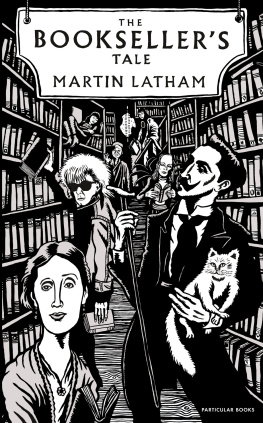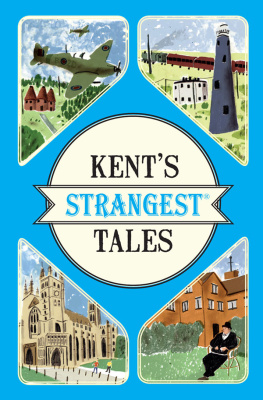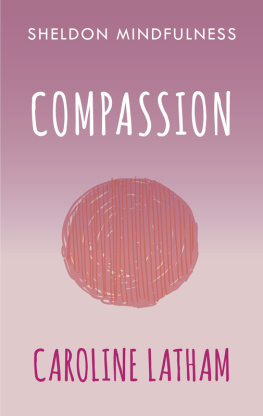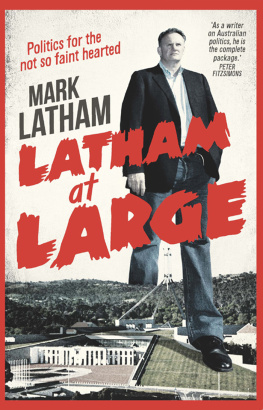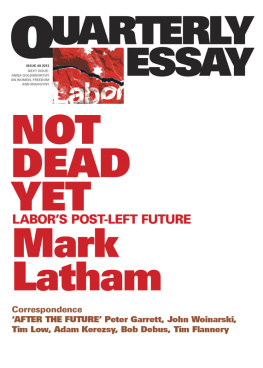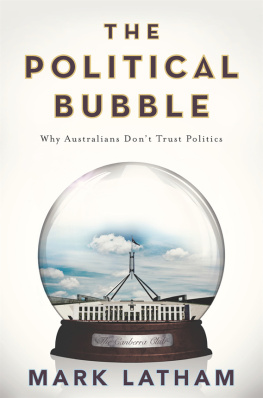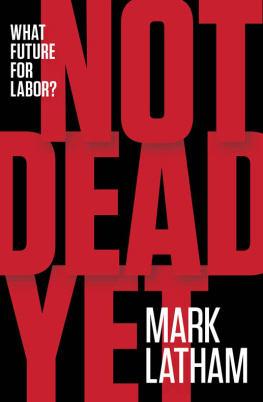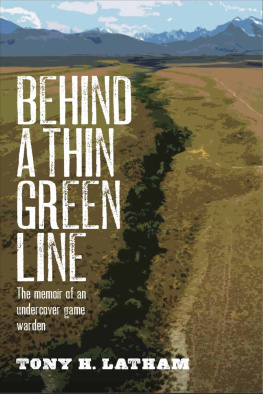Martin Latham - The Booksellers Tale
Here you can read online Martin Latham - The Booksellers Tale full text of the book (entire story) in english for free. Download pdf and epub, get meaning, cover and reviews about this ebook. year: 2020, publisher: Penguin Books Ltd, genre: Non-fiction / History. Description of the work, (preface) as well as reviews are available. Best literature library LitArk.com created for fans of good reading and offers a wide selection of genres:
Romance novel
Science fiction
Adventure
Detective
Science
History
Home and family
Prose
Art
Politics
Computer
Non-fiction
Religion
Business
Children
Humor
Choose a favorite category and find really read worthwhile books. Enjoy immersion in the world of imagination, feel the emotions of the characters or learn something new for yourself, make an fascinating discovery.
- Book:The Booksellers Tale
- Author:
- Publisher:Penguin Books Ltd
- Genre:
- Year:2020
- Rating:5 / 5
- Favourites:Add to favourites
- Your mark:
- 100
- 1
- 2
- 3
- 4
- 5
The Booksellers Tale: summary, description and annotation
We offer to read an annotation, description, summary or preface (depends on what the author of the book "The Booksellers Tale" wrote himself). If you haven't found the necessary information about the book — write in the comments, we will try to find it.
The Booksellers Tale — read online for free the complete book (whole text) full work
Below is the text of the book, divided by pages. System saving the place of the last page read, allows you to conveniently read the book "The Booksellers Tale" online for free, without having to search again every time where you left off. Put a bookmark, and you can go to the page where you finished reading at any time.
Font size:
Interval:
Bookmark:

PENGUIN BOOKS
UK | USA | Canada | Ireland | Australia
New Zealand | India | South Africa
Penguin Books is part of the Penguin Random House group of companies whose addresses can be found at global.penguinrandomhouse.com.

First published in Great Britain by Particular Books 2020
Text copyright Martin Latham, 2020
The moral right of the author has been asserted
Cover illustration: Neal Fox
ISBN: 978-0-141-99124-5
This ebook is copyright material and must not be copied, reproduced, transferred, distributed, leased, licensed or publicly performed or used in any way except as specifically permitted in writing by the publishers, as allowed under the terms and conditions under which it was purchased or as strictly permitted by applicable copyright law. Any unauthorized distribution or use of this text may be a direct infringement of the authors and publishers rights and those responsible may be liable in law accordingly.
French actress Barbara Laage reading in her apartment, 1946. Nina Leen/The LIFE Picture Collection via Getty Images.
The library at Holland House in Kensington, London, after a Molotov Breadbasket fire bomb. Central Press/Hulton Archive/Getty Images.
An advert for the penny dreadful Spring Heeled Jack (1886). Alamy Stock Photo.
A pedlar carries his books through the countryside (1886). Chronicle/Alamy Stock Photo.
Young man reading in a library. Stewart Charles Cohen/Getty Images.
Le Bibliophile dautrefois, frontispiece by Flicien Rops for Octave Uzanne, La Nouvelle Bibliopolis (1897). Photo authors own.
A hare and a dog playing an organ, marginalia from the Macclesfield Psalter, East Anglia, c.1330. Bridgeman Images.
Martin Lathams well-thumbed copy of Brideshead Revisited. William Latham.
The Reading Herald, wood engraving after A. Fabres, France, 19th century. INTERFOTO/Alamy Stock Photo.
Two women browse at a bouquinistes stall along the quais of the Seine in Paris. KEYSTONE-FRANCE/Gamma-Rapho via Getty Images.
A canal in Venice. Andrew Hoang.
Customers browse outside a New York bookshop. Alexander Alland, Jr./Corbis Historical: Getty Images.
A Bloomsbury bookshop, 19267. The Print Collector/Heritage Images/Alamy Stock Photo.
There is a book which has not moved a centimetre in 800 years. It is on the tomb of Eleanor of Aquitaine in Fontevraud Abbey, near Poitiers. Her turbulent life is all behind her as she lies in deep repose, holding up an open Bible. She rests as we all do in bed when, finished with talking or tea, we become one with a book, lost in a private world. The story of humanitys love affair with books is, to a visitor from another galaxy, one of our strangest tales.
This history of the book explores our relationship with the physical book, showing how it has deepened our sense of self. The printed book helped to inaugurate an Earth-wide springtime of consciousness. Curled up with a book, we continue to find new selves.
Such private reading only became widespread in the age of print. In most languages the word read originally meant read aloud. Alexander the Greats men stared in puzzlement when he read silently, and, until the age of print, being read to was commoner than reading privately. With this new privacy came a deepening of emotional involvement, of affect. The pioneer Victorian sociologist Harriet Martineau felt she often became the author she was reading, and novels such as Clarissa generated extraordinary convulsive weeping and exaltation. Post-Gutenberg, our imagination was mainlining stories, high on new realms.
Private reading gave us new inner dimensions. We feel the truth of this in the stacks of a great library, or in corners of a bookshop, places which give us a sense of immanence, of being on the verge of infinite inner space. The ancient library of Alexandria may not even have existed, but, as the classicist Edith Hall says, the idea of such a library is almost as important to our collective psyche as its reality. We know instinctively that we are both infinite and serendipitous, so we love getting lost in bookshops and libraries, and accidentally finding books which unlock our various hidden selves.
Our passionate relationship with actual books (not the text of literary theorists) has been enacted in many little-documented physical ways. It can be, Virginia Woolf observed, an almost sexual interplay. I have seen this in thirty years of bookselling: customers stroking a books cover, peeking under the jacket, surreptitiously closing their eyes to smell the valley of pages this sometimes accompanied by a quiet moan of pleasure hugging it after purchase, and even giving it a little kiss.
Book users cannot explain why they love holding books, and, after hearing them a few hundred times over the years say at length that they cannot explain it, I am beginning to think that they do not want to analyse a feeling so inner.
The book, of paper from trees, is halfway to the forest, that great source of myth. Tech devices are not only made of colder, denatured materials, they are relentlessly demanding. In 1913 Kafka, with astonishing prescience, described the future in a letter to his would-be girlfriend Felice, who sold dictation machines. He detested such machines, and celebrated the way he might stare out of the office window mid-dictation, then hear the soughing of his secretarys nail file as she joined in the secret dawdle. He told Felice that faced with such machines we become degraded factory workers. Today, we all sometimes feel like grunts serving our machines; we do not feel that with the book. Kafka predicted that such machines would end up talking to us, making suggestions as to restaurants, correcting pronunciation even. Such a technology was preposterous even when I started this book a decade ago, but is now commonplace. Poor old Felice did not reply to Franzs bonkers-seeming letter.
The cold tech of digital devices offers interactivity, but it is an interactivity with formatting rules, from liking something to blogging, very far from how many interact with books warm tech by writing in them. Montaignes marginalia on his copy of Lucretius represent a whole strand of his thought, as do Blakes heated scribblings on Joshua Reynolds Discourses. Coleridges marginalia fill an entire volume of his collected works. But marginalia have been literally marginalized by academic librarians, especially in Victorian times, when they were sliced off and binned in rebinding operations and even this happened to Miltons marginalia bleached out. The legacy of this Benthamite hygiene is our excessive opposition to writing in books today. One recent historian of marginalia laments that, unless we relax, we wont have a record of our fresh, unmediated reactions to books.
With a similarly irreverent biblio-sensuality, from about 1600 until about 1870, book users cut out favourite passages and pasted them into commonplace books, which were interspersed with their own manuscript thoughts. This craze went largely unrecorded because of the attitude of librarians such as M. R. James, who described commonplace books as a sort of residue or sediment. To add vexation to the librarians empiricist mind, these books were unclassifiables were they books or manuscripts? They were thrown out in skiploads until as late as the 1980s.
Font size:
Interval:
Bookmark:
Similar books «The Booksellers Tale»
Look at similar books to The Booksellers Tale. We have selected literature similar in name and meaning in the hope of providing readers with more options to find new, interesting, not yet read works.
Discussion, reviews of the book The Booksellers Tale and just readers' own opinions. Leave your comments, write what you think about the work, its meaning or the main characters. Specify what exactly you liked and what you didn't like, and why you think so.

